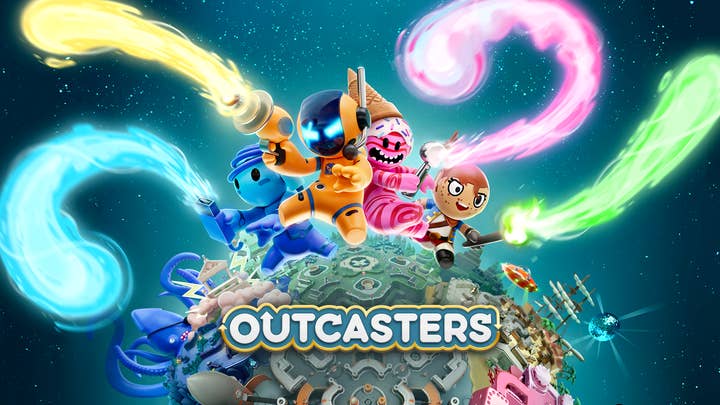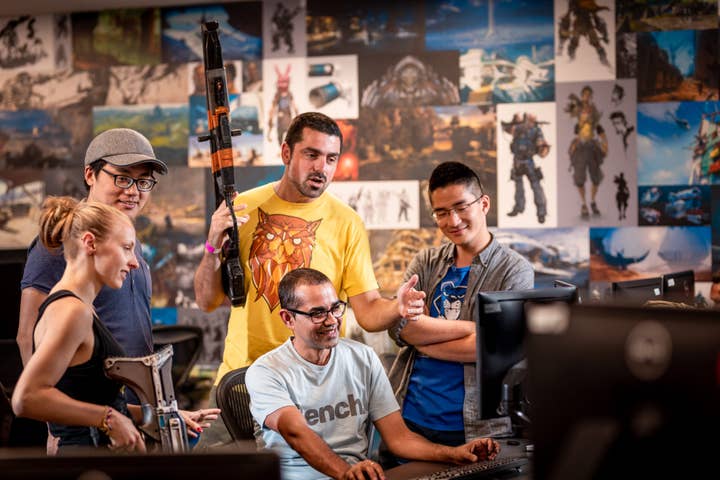How Tencent gave Splash Damage the "cheat codes for game development"
Expansion, acquisitions, and more original IP: CEO Richard Jolly opens up about the opportunities Tencent has created
When it transpired in 2016 that Splash Damage had been acquired by a Chinese poultry firm, the headline raised more than a few eyebrows.
But it turned out that Leyou had more than one ace up its sleeve. The company already owned a majority stake in Warframe developer Digital Extremes and went to buy 20% of Texas-based studio Certain Affinity the next year.
Leyou initially expanded into games to "mitigate the volatile and cyclical nature of the poultry business," but it soon became clear that it was a force to be reckoned with. It even struck a deal with Amazon for its now defunct Lord of the Rings MMO.
And, like all things successful in games, that means it attracted Tencent's attention. Reports of parties interested in acquiring Leyou emerged in July 2020, with Sony even reportedly considering a bid at the time. Leyou confirmed in September that Tencent was in the running for its acquisition, before the takeover was approved in December for a substantial $1.5 billion.
"For us, it's impossible to ignore just what being backed by Tencent offers a studio like ours. It's felt like having the cheat codes for game development"
Both Digital Extremes and Splash Damage were prompt to react and point out that they were going to retain their independence despite changing hands. In a blog post published at the time, Splash Damage co-founder and CEO Richard Jolly teased exciting prospects for the company, but it's been radio silence ever since.
"For us, it's impossible to ignore just what being backed by Tencent offers a studio like ours," he now tells GamesIndustry.biz. "People tend to forget that Tencent is the largest company in the world when it comes to video games. This not only provides us stability, but also access to a whole bunch of experience and resources that help us make better games for our players. It's really felt a little bit like having the cheat codes for game development.
"Looking ahead, we've got some very ambitious plans for our next decade that we had already started on before the acquisition. Now, we're able to accelerate those. As one of the founders of the studio, I can honestly say that this is the most excited I've ever been for where we're headed."

Jolly believes it's Splash Damage's extensive experience as multiplayer developers that initially caught Tencent's attention. "If you can get complete strangers to work together online, magical things happen," he says.
Splash Damage released Outcasters late last year, a title that leveraged its decades of expertise in competitive online shooters, having previously worked on the likes of Brink, and the Quake and Wolfenstein franchises.
It was also the studio's first original IP since Dirty Bomb, which Splash Damage stopped developing only two months after launch back in 2018. But having the support of Tencent will allow the studio to bolster its efforts on the original IP front, Jolly continues.
"Without a doubt the biggest shift is that this has accelerated our transition from traditional work-for-hire to projects where we have true ownership. This has always been our goal as a studio and we're able to get there a lot faster now.
"Without a doubt the biggest shift is that this has accelerated our transition from traditional work-for-hire to projects where we have true ownership"
"This also means publishing and operating our own games and having that direct relationship with our community of players. Splash Damage was started by three friends who met online playing Quake competitively, so this is especially meaningful to us. This is all very different from work-for-hire where you're ultimately beholden to an external customer. We're currently expanding our studio with additional divisions to take full advantage of the ownership and stability we now have.
"We've always wanted to create more original IP and that's absolutely going to be a greater focus for us now. We also have a successful history of working with licensed IP, and we expect that to continue. It really comes down to what's right for the experience we're building."
Jolly adds that the studio has had self-funded projects for many years now, but they often "needed to take a backseat to [its] work-for-hire projects as those were paying most of the bills." Before the Tencent acquisition, Splash Damage had already begun scaling back its focus on the traditional work-for-hire business.
"While we gained a lot of experience supporting other people's games, we really wanted to take the studio back to a place where we have true ownership of what we're creating. That's not to say we won't partner with other companies from here on, but we can now be far more selective about who we team up with. For example, we only tend to look for partners who are experts in their field and that we can learn from. It's also very important for us that they share our values when it comes to the games we create, and how we treat staff and our players."

Tencent -- which we dubbed the industry's "silent giant" back in 2016 -- has the reputation of being quite hands-off as a partner, and Jolly is keen to highlight that this is exactly the type of relationship that suits Splash Damage.
"After starting out as a mod team in the late '90s, Splash Damage was independently owned for many years, and we've always had to be entrepreneurial to survive in what's always been a very competitive industry. Like so many other independent studios, we certainly faced our share of challenges along the way.
"Being part of the Tencent family now absolutely plays to our strengths in that regard: they trust us to do what's right for our studio and the games we're working on, and we get to take advantage of their vast expertise, global reach, and resources to help us [reach] our full potential."
Tencent has had a very aggressive M&A strategy for the past few years. In 2020 only, the Chinese company invested in 31 companies in the games industry. And Jolly is not closed to the idea of collaborating with one of the numerous Tencent studios scattered across the world.
"We are now also at a point where we are actively looking outward to see how we can help smaller studios by having them join the Splash Damage family"
"We're big fans of so many of the games created by the studios in the Tencent family, so this is a very interesting question," Jolly says when asked about Splash Damage's interest in mix and matching properties across Tencent studios. "It's certainly a possibility if it's right for the game. Right now, we're focusing on sharing learnings to help all of us become better at what we do."
While the money from the acquisition went directly to Leyou's shareholders, Jolly says, changing hands did accelerate things on the recruitment side, with the studio also looking to expand beyond its original location.
"Our London studio is currently rapidly approaching 400 incredibly talented people, and we have more joining us every week. We've got more open roles than ever before. These pretty much cover all disciplines and seniority levels, so there's something there for everyone. We'll also be looking to establish additional development studios at other locations in the months and years to come."
Jolly also hints at the possibility for Splash Damage to acquire other studios, adding that the company will have more to say on the topic later this year.
"We are now also at a point where we are actively looking outward to see how we can help smaller studios by having them join the Splash Damage family and sharing with them what we've learned over the past 20 years."

When asked about the current consolidation trend -- whether it's from Tencent, Embracer Group or Microsoft -- that is creating big groups within the industry, Jolly doesn't believe it represents a threat to independent development but rather sees it as an opportunity.
"I can certainly understand why on the face of it people might be worried, but I think it's a more nuanced situation than it seems," he says. "Splash Damage spent many years as an independent developer since we started the studio all the way back in 2001, so I can certainly empathise with the struggles faced by them.
"It feels like every few years, there's a story about how indie development is dying off"
"It feels like every few years, there's a story about how indie development is dying off. In fact, independent game development is thriving, and we've seen the rise of the indie publisher really cemented within the industry. This year alone we've seen breakout successes like Valheim and Loop Hero, and that kind of amazing creativity is not going anywhere. The main issue that many of these titles have is discoverability, which I suppose is another conversation entirely.
"Overall, I believe that this kind of investment can unlock the true potential of studios and creators if they're empowered to focus on making great games. The other important thing to consider here is that it doesn't lock these games into a specific ecosystem, which is obviously great for players."
In the case of Splash Damage specifically, it does look like being acquired has been a chance to unlock its true potential. Jolly says the studio is now very different from what it was just a year ago, with far more stability and control.
"We've got several ambitious projects where our teams have true ownership. We're going to be publishing and operating our own games. We've got an amazing amount of talent and we're still growing considerably, including our largest-ever intake of entry level roles to support the next generation.
"This truly is the next chapter of our story. It's a fantastic opportunity to join our studio and help us take Splash Damage into the future."
